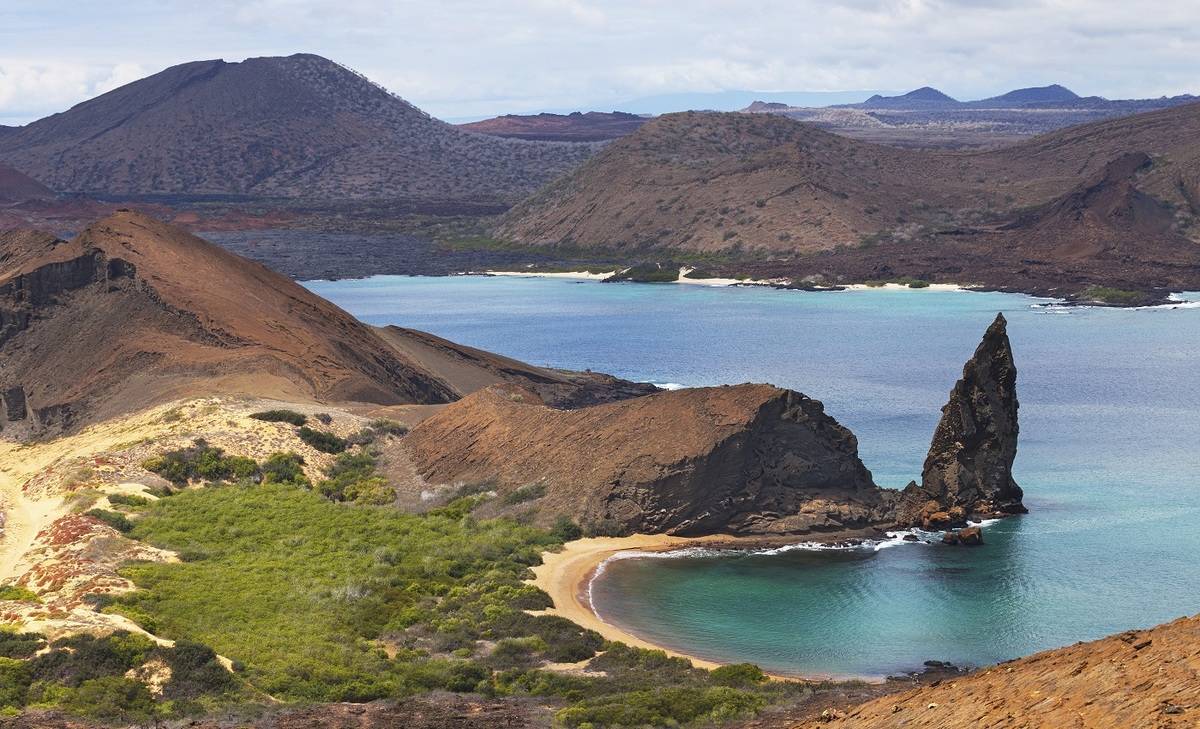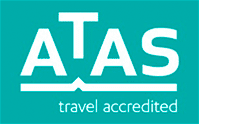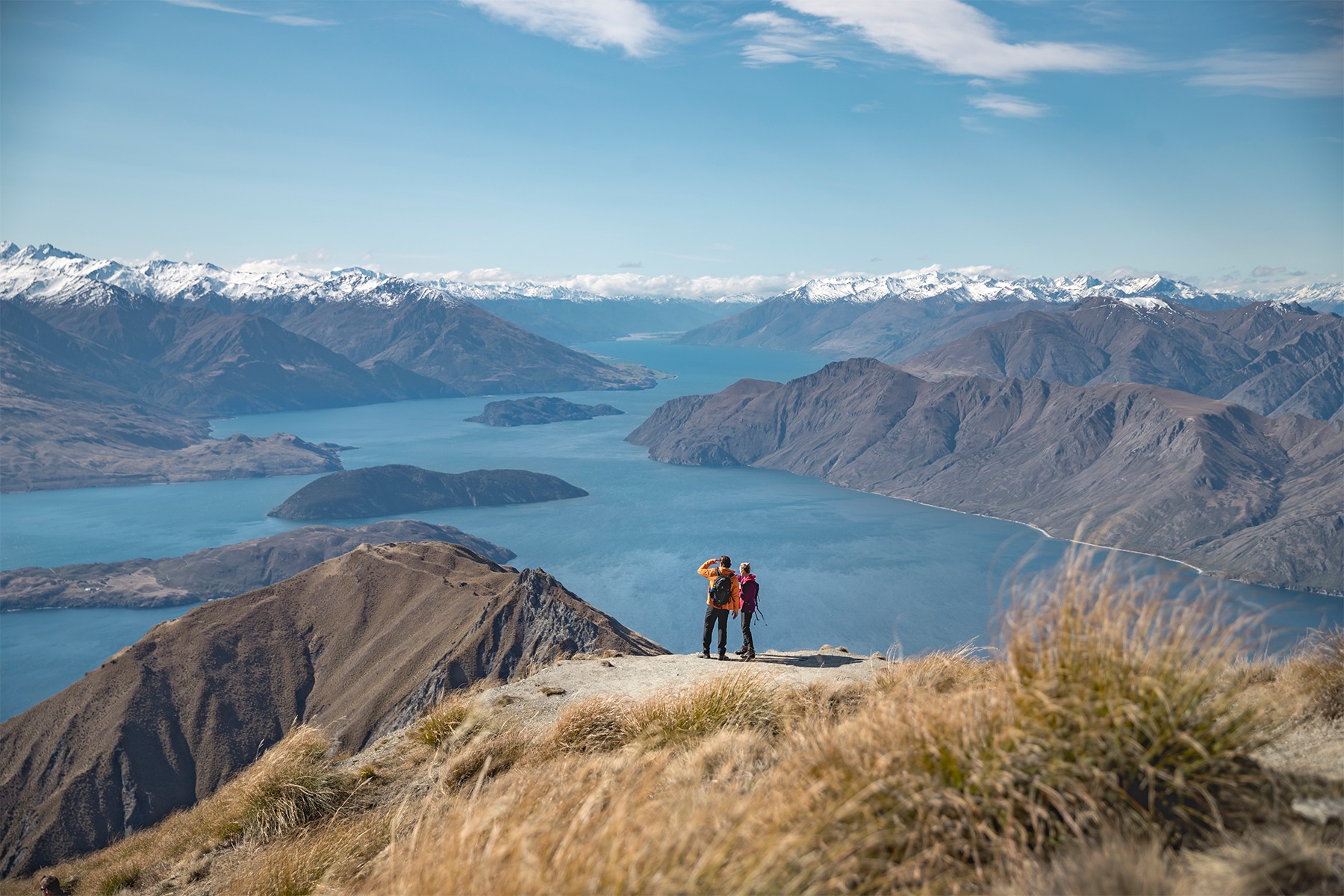M/C Seaman Journey: Central & West Galapagos Islands
8 Days - M/C Seaman Journey
This 8-day cruise offers an extensive discovery of Santa Cruz, Santa Fe and Isabela Islands aboard the M/C Seaman Journey. Begin your journey with a climb through agricultural lands, and encountering giant Galapagos Tortoises. Land on Egas Port where volcano tuff deposits are responsible for the formation of its very special black sand beach. Along the way, you will meet many friendly companions - sea lions, penguins, sea turtles, marine iguanas and many more!
from AUD $11451pp

Home » M/C Seaman Journey: Central & West Galapagos Islands
Itinerary Highlights
- Learn about the rock and lava formations of Tagus Cove, Moreno Point and Vicente Roca Point
- Walk along the special black beach on Egas Port
- Meet Galapagos penguins, sea lions, sea turtles, marine iguanas, and many more friendly species!
- Journey through Santa Cruz Highlands and learn about the island's variety of life and geology
Itinerary in Brief
- Day 1: Baltra Airport - Santa Cruz Highlands
- Day 2: Mangle Point - Moreno Point
- Day 3: Urbina Bay - Tagius Cove
- Day 4: Espinosa Point - Vicente Roca Point
- Day 5: Espumilla Beach - Egas Port
- Day 6: Rabida Island - Chinese Hat
- Day 7: Sullivan Bay - Bartolome
- Day 8: Bachas Beach - Baltra Airport
*Looking for a longer cruise? M/C Seaman Journey also offers 11, 12 and 15 day itineraries. Contact us for more information.

Day 1: Baltra Airport - Santa Cruz Highlands
Our guide will pick you up at Baltra Airport, and will carry your luggage to the bus that transports the tourists to the ferries to cross the Itabaca Channel, after this passengers will be taken by another bus to the first visit to Ranch Mazanillo where visitors must wear comfortable walking shoes, light clothing and to carry a waterproof jacket, sun-block lotion, a camera and repellent for the first activity.
The visit to Ranch Manzanillo includes a picnic lunch and a short walk before going on board the Motor Catamaran. It is important to follow these instructions in order to accomplish this itinerary properly. Also, please be aware that passenger´s luggage will be sent directly to the Seaman Journey yacht.
Journeying across Santa Cruz into the highlands visitors are delighted by the island’s variety of life and geology. Beginning at the coast and travelling across Santa Cruz the road departs from Puerto Ayora climbing through the agricultural lands and into the mist covered forests. Santa Cruz possesses all of the various life zones present in the archipelago. Santa Cruz offers excellent opportunities for viewing wild Galapagos Tortoises.
Day 2: Mangle Point - Moreno Point
Off the eastern coast of Fernandina is Mangle Point, a great snorkelling site and a beautiful location for riding in a panga or zodiac through a grove of mangrove trees. Whether you hike, snorkel, or stay in your panga for a ride through the red mangrove trees, this second site of Fernandina Island is equally memorable. While you are on your ride, you are likely to see sea lions, tortoises, pelicans, rays and birds too numerous to name them all.
After lunch, we will stop by Moreno Point, which is located on the north coast of Isabela Island between the volcano Sierra Negra and Cerro Azul volcano. The trail runs along a lava flow Pahohoe (solidified lava in the form of corrugated or an accordion) into a complex of coastal lagoons, its main attraction are several species of birds which can be found around this lakes and mangroves.
Day 3: Urbina Bay - Tagus Cove
This morning we will visit Urbina Bay, located at the base of Alcedo Volcano on the west coast, between Tagus Cove and Elizabeth Bay. This area experienced a major uplift in 1954, causing the land to rise over 16ft. The coast expanded half a mile out, leaving marine life stranded on the new shore. This area is also a great place for snorkelling. In Urbina Bay, you can see a lot of Darwin’s finches. Its main attraction is the land iguanas, larger than in places like South Plaza Island, Galapagos tortoises also in the wild, sometimes even out of season they are on the bottom of the islands.
Our afternoon visit to Tagus Cove is located west of Darwin Volcano on Isabela Island. This was a favourite spot for pirates and whalers, a tradition is still observed that has continued since that time: the inscription of the names of boats. At the start of the walk, going up and passing the staircase, is a small cave where you will find inscriptions dating to the 1800s.
Day 4: Espinosa Point - Vicente Roca Point
Espinoza Point is a place famous for its large colonies of marine iguanas and as the habitat of unique species like the flightless cormorant, Galapagos penguin, Galapagos hawk, and Galapagos snake.
One of the most impressive and spectacular places of the enchanted Galapagos Islands; with high cliffs and tuffstone, ash and lava formations give this area a majestic touch. Located in the north-western coast of the island; comprises two distinct inlets. This large bay has a spectacular marine life. Here, you can see seahorses, sea turtles and the strange yet fascinating Mola-mola or sunfish. This bay is a great place to practice Panga Ride and Snorkeling. We also found: Penguins, Blue-footed boobies, Terns, Boobies, Sea lions. Also you can snorkel and observe sea turtles, stingrays and puffer fishes.
Day 5: Espumilla Beach - Egas Port
Espumilla beach is located in northern coast of Santiago Island in James Bay. During the last presence the El Niño phenomenon, one of the two lagoons in this site, underwent a process of sedimentation, thus causing the disappearance of a representative colony of flamingos. The main attractions are the palosanto forest and the marvellous. The beach is an important site for nesting marine turtles.
Its black beach is located at the west side of the island and is the main attraction of the island. Their volcanic tuff deposits have favoured the formation of this special black sand beach. This site is called Puerto Egas, because there was an attempt of company of Hector Egas, to start the exploitation of salt, which failed because the price of salt in the continent was very cheap, and did not justify its exploitation in Galapagos. The project was abandoned and they left their infrastructure.
Day 6: Rabida Island - Chinese Hat
Rábida Island is unique for its colourful red rock and sand formations. The volcanic material on this island is very porous and external factors as rain, salt water, and sea breeze have acted as an oxidising agent. A short walk along a trail will lead you to a coastal lagoon behind the beach which permits you to observe the land birds such as finches, doves, yellow warblers, and mocking birds.
Reaching Chinese Hat, this is a small islet (1 km²) located just off the southeastern tip of Santiago Island. It is a recent volcanic cone, shaped like a Chinese hat when seen from north side. On the west, you will see lava formations, formed under the sea and raised upward, this is why coral heads are found on the lava. This is an excellent visit for interpretation of geological features such as lava tubes and lava flows. The landscape is filled with sea lions colonies, marine iguanas, and Galapagos penguins.
Day 7: Sullivan Bay - Bartolome
Santiago, also called James, or San Salvador Island, is located in the west central part of the Galapagos archipelago. It is the fourth largest island in the archipelago (following Isabela, Fernandina and Santa Cruz). Along with some of the large western volcanoes of Isabela and Fernandina, Santiago is also volcanically active, with many young flows and cones to be seen, particularly along the south, west, and east coasts.
Bartolome Island is situated across Sullivan Bay. It has an altitude of 114 meters , from where we can observe one of the most beautiful sceneries of the Galapagos Islands such as: Volcanic cones, lunar- like craters, lava fields, and the famous Toba formed pinnacle eroded by the sea. There is very little vegetation on this island. It has two breathtaking beaches where marine turtles exist and at the base of the pinnacle, as well as a very small colony of Galapagos penguins.
Day 8: Bachas Beach - Return to Baltra airport
These two small beaches are found to the West of Turtle Cove. Their sand is made of decomposed coral, which makes it white and soft, making it a favourite nesting site for sea turtles. Behind one of the beaches there is a small brackish water lagoon, where occasionally is possible to observe flamingos and other coastal birds, such as black-necked stilts and whimbrels. The other beach is longer, but it has two old barges that were abandoned during the Second World War, when the USA used Baltra Island as a strategically point to protect the Panama Channel.
After the morning excursion you will be taken to the airport for your flight to the mainland.
| Dates | Cabin | From | Special Offer |
|---|---|---|---|
| 02 Aug 2024 - 09 Aug 2024 | AUD $11451pp | ||
| Twin Cabin | AUD $11451pp | Contact us | |
| Matrimonial Suite | AUD $11904pp | Contact us | |
| 16 Aug 2024 - 23 Aug 2024 | AUD $11451pp | ||
| Twin Cabin | AUD $11451pp | Contact us | |
| Matrimonial Suite | AUD $11904pp | Contact us | |
| 30 Aug 2024 - 06 Sep 2024 | AUD $11451pp | ||
| Twin Cabin | AUD $11451pp | Contact us | |
| Matrimonial Suite | AUD $11904pp | Contact us | |
| 13 Sep 2024 - 20 Sep 2024 | AUD $11451pp | ||
| Twin Cabin | AUD $11451pp | Contact us | |
| Matrimonial Suite | AUD $11904pp | Contact us | |
| 27 Sep 2024 - 04 Oct 2024 | AUD $11451pp | ||
| Twin Cabin | AUD $11451pp | Contact us | |
| Matrimonial Suite | AUD $11904pp | Contact us | |
| 11 Oct 2024 - 18 Oct 2024 | AUD $11451pp | ||
| Twin Cabin | AUD $11451pp | Contact us | |
| Matrimonial Suite | AUD $11904pp | Contact us | |
| 25 Oct 2024 - 01 Nov 2024 | AUD $11451pp | ||
| Twin Cabin | AUD $11451pp | Contact us | |
| Matrimonial Suite | AUD $11904pp | Contact us | |
| 08 Nov 2024 - 15 Nov 2024 | AUD $11451pp | ||
| Twin Cabin | AUD $11451pp | Contact us | |
| Matrimonial Suite | AUD $11904pp | Contact us | |
| 22 Nov 2024 - 29 Nov 2024 | AUD $11451pp | ||
| Twin Cabin | AUD $11451pp | Contact us | |
| Matrimonial Suite | AUD $11904pp | Contact us | |
| 06 Dec 2024 - 13 Dec 2024 | AUD $11451pp | ||
| Twin Cabin | AUD $11451pp | Contact us | |
| Matrimonial Suite | AUD $11904pp | Contact us | |
| 20 Dec 2024 - 27 Dec 2024 | AUD $11451pp | ||
| Twin Cabin | AUD $11451pp | Contact us | |
| Matrimonial Suite | AUD $11904pp | Contact us | |
**Prices are per person based on twin / shared accommodation.
**Single supplements may apply
Cabin Details
Matrimonial Suite
Panoramic windows to enjoy the wonderful landscapes of the islands, Private bathroom, hot/cold water, hair dryer, Queen beds, Safe box in all cabins for
personal belongings, Air conditioning with independent controls.
Twin Cabin
Panoramic windows to enjoy the wonderful landscapes of the islands, Private bathroom, hot/cold water, hair dryer, Safe box in all cabins for
personal belongings, Twin beds, Air conditioning with independent controls
M/C Seaman Journey Deckplan

Specifications
- Type: Motor Catamaran
- Electric system: 2x 50 kw IMO
- Category: Boutique Yacht Naturalist Liveaboard
- Electric power: 110v and 220v AC/DC
- Material construction: Fiberglass
- Cruising Speed: 10 knots
- Length: 90 feet (27.6 meters)
- Water capacity: 3000 gallons
- Beam: 36.08 feet (11 meters)
- Diesel capacity: 2500 gallons
- Draft: 4.75 feet (1.45 meters)
- Passengers: maximum 16
- Year build: 2007
- Crew: 9 members
- Main engines: 2x Cummins 350 hp IMO
Whats included?
- Shipboard accommodation
- All meals during the voyage
- Pre and post cruise transfers
- All expedition shore excursions
- Bilingual naturalist guide
- Use of kayaks, and snorkelling equipment
What’s not included?
- Air transportation
- Passport, visa and immigration fees
- Airport arrival/departure taxes
- Travel protection plan
- Additional hotel nights
- Christmas & New Year surcharges
- Galapagos National Park fee US$100 per person until 31 July 2024
- Galapagos National Park fee US$200 per person from 1 August 2024
- Transit control card US$20 per person
- Wetsuit rental
- Alcoholic beverages
- Laundry service
- Gratuities



















